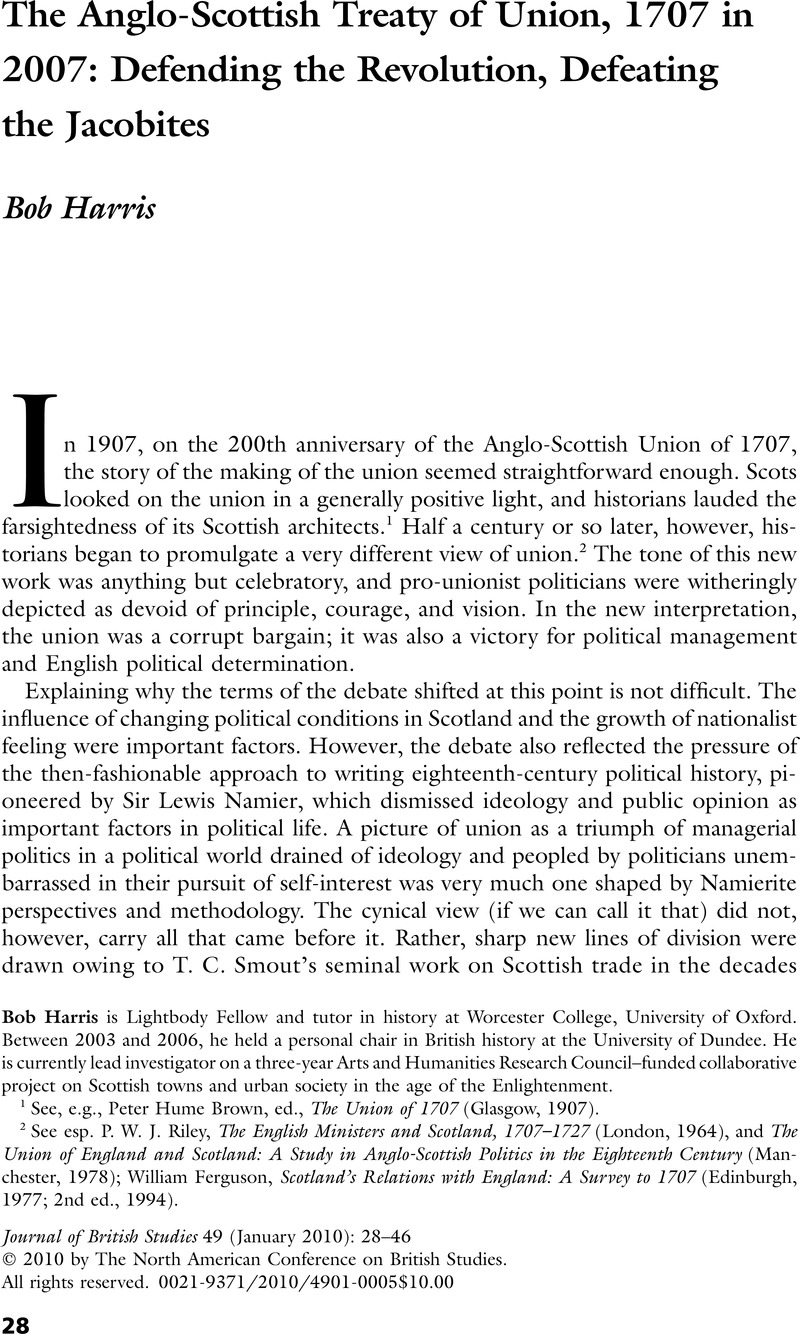Published online by Cambridge University Press: 21 December 2012

1 See, e.g., Brown, Peter Hume, ed., The Union of 1707 (Glasgow, 1907)Google Scholar.
2 See esp. Riley, P. W. J., The English Ministers and Scotland, 1707–1727 (London, 1964)Google Scholar, and The Union of England and Scotland: A Study in Anglo-Scottish Politics in the Eighteenth Century (Manchester, 1978)Google Scholar; Ferguson, William, Scotland's Relations with England: A Survey to 1707 (Edinburgh, 1977; 2nd ed., 1994)Google Scholar.
3 Smout, T. C., Scottish Trade on the Eve of the Union, 1660–1707 (Edinburgh, 1963)Google Scholar.
4 Smout, T. C., “The Road to Union,” in Britain after the Glorious Revolution, 1689–1714, ed. Holmes, Geoffrey (London, 1969), 176–96CrossRefGoogle Scholar.
5 See the essays in Robertson, John, ed., A Union for Empire: Political Theory and the Union of 1707 (Cambridge, 1995)Google Scholar; Armitage, David, The Ideological Origins of the British Empire (Cambridge, 2000)CrossRefGoogle Scholar.
6 See esp. Robertson, John, “Union, State and Empire: The Britain of 1707 in the European Setting,” in An Imperial State at War: Britain from 1689 to 1815, ed. Stone, Lawrence (London, 1999), 224–57Google Scholar, and “Empire and Union: Two Concepts of the Early Modern European Order,” in Robertson, Union for Empire, 3–36.
7 This debate is perhaps best approached through Devine, T. M., Scotland's Empire, 1600–1815 (London, 2003)Google Scholar, chap. 3, and “The Union of 1707 and Scottish Development,” Scottish Economic and Social History 5 (1985): 23–40CrossRefGoogle Scholar; Whatley, Christopher A., “Economic Causes and Consequences of the Union of 1707: A Survey,” Scottish Historical Review 68, no. 2 (October 1989): 156–87Google Scholar, and Scottish Society, 1707–1830: Beyond Jacobitism, Towards Industrialisation (Manchester, 2000), chaps. 1–2.
8 Macinnes, Allan I., “Influencing the Vote: The Scottish Estates and the Treaty of Union, 1706–07,” History Microcomputer Review 2 (1990): 11–25Google Scholar. See also the discussion of the payments from the equivalent fund in Shaw, John Stuart, The Political History of Eighteenth-Century Scotland (Basingstoke, 1999), 1–17CrossRefGoogle Scholar.
9 Two recent books on the union restate their authors' earlier published views, largely and in condensed form in one case and with little original research and no new perspectives in the other. They are, respectively, Scott, Paul Henderson, The Union of 1707: Why and How? (Edinburgh, 2006)Google Scholar; and Fry, Michael, The Union: England, Scotland and the Treaty of Union (Edinburgh, 2006)Google Scholar. Fry's is essentially a narrative account, a very readable one, that appears to draw heavily on the work of Riley and Ferguson.
10 Whatley, Christopher A. with Patrick, Derek J., The Scots and the Union (Edinburgh, 2006), 29CrossRefGoogle Scholar.
11 Macinnes, Allan I., Union and Empire: The Making of the United Kingdom in 1707 (Cambridge, 2007), 9.CrossRefGoogle Scholar
12 Whatley, Scots and the Union, 48.
13 Quoted in Stephen, Jeffrey, Scottish Presbyterians and the Act of Union of 1707 (Edinburgh, 2007), 201CrossRefGoogle Scholar.
14 Whatley, Christopher and Patrick, Derek J., “Contesting Interpretations of the Union of 1707: The Abuse and Use of George Lockhart of Carnwath's Memoirs,” Journal of Scottish Historical Studies 27, no. 1 (July 2007): 24–47.CrossRefGoogle Scholar
15 Macinnes, Union and Empire, 288.
16 Ibid., 292.
17 The phrase is Devine’s, in his Scotland's Empire, 1600–1815, 59.
18 Whatley, Scots and the Union, 218, 249.
19 On this theme, see esp. Armitage, David, “The Scottish Vision of Empire: Intellectual Origins of the Darien Venture,” in Robertson, Union for Empire, 97–188Google Scholar, and Ideological Origins, chap. 6.
20 Whatley, Scottish Society, chap. 1, and “Taking Stock: Scotland at the End of the Seventeenth Century,” in Anglo-Scottish Relations from 1603 to 1900, ed. Smout, T. C. (Oxford, 2005), 103–25CrossRefGoogle Scholar.
21 Saville, Richard, “Scottish Modernisation prior to the Industrial Revolution,” in Eighteenth Century Scotland: New Perspectives, ed. Devine, T. M. and Young, John R. (East Linton, 1999), 6–23.Google Scholar
22 See esp. Devine, Scotland's Empire, chap. 3.
23 Macinnes, Union and Empire, 47.
24 Ibid., 172.
25 Pocock, J. G. A., “Empire, State and Confederation: The War of American Independence as a Crisis in Multiple Monarchy,” in his The Discovery of Islands: Essays in British History (Cambridge, 2005), 134–63.CrossRefGoogle Scholar
26 Macinnes, Union and Empire, 11.
27 Whatley, Scots and the Union, 189.
28 Simms, Brendan, Three Victories and a Defeat: The Rise and Fall of the First British Empire, 1714–1783 (London, 2007)Google Scholar. For the Anglo-Irish union, see the comments of Jupp, Peter in his “Britain and the Union, 1797–1801,” Transactions of the Royal Historical Society, 6th ser., 10 (2000): 197–219, esp. 208–9Google Scholar.
29 Stanwood, Owen, “The Protestant Moment: Antipopery, the Revolution of 1688–1689, and the Making of an Anglo-American Empire,” Journal of British Studies 46, no. 3 (July 2007): 481–508.CrossRefGoogle Scholar
30 Young, John R., “The Parliamentary Incorporating Union of 1707: Political Management, Anti-unionism and Foreign Policy,” in Devine and Young, Eighteenth Century Scotland, 24–52.Google Scholar
31 Bowie, Karin, Scottish Public Opinion and the Anglo-Scottish Union, 1699–1707 (Woodbridge, 2007)Google Scholar.
32 Stephen, Presbyterians and the Act of Union, 156–57.
33 Ibid., 140.
34 Whatley and Patrick, “Contesting Interpretations,” 35.
35 Bowie, Scottish Public Opinion and the Anglo-Scottish Union, 3.
36 Lake, Peter and Pincus, Steve, “Rethinking the Public Sphere in Early Modern England,” Journal of British Studies 45, no. 2 (April 2006): 270–92CrossRefGoogle Scholar, esp. 286 n. 64, where they write, “We are emphatically not telling a British story.”
37 Whatley and Patrick, “Contesting Interpretations,” 35. Whatley and Patrick also cite the Jacobite James Carnegy to the effect that only if James VIII were to disavow his Catholicism as well as declare himself against the union would such an alliance be even conceivable.
38 Stephen, Presbyterians and the Act of Union, 31.